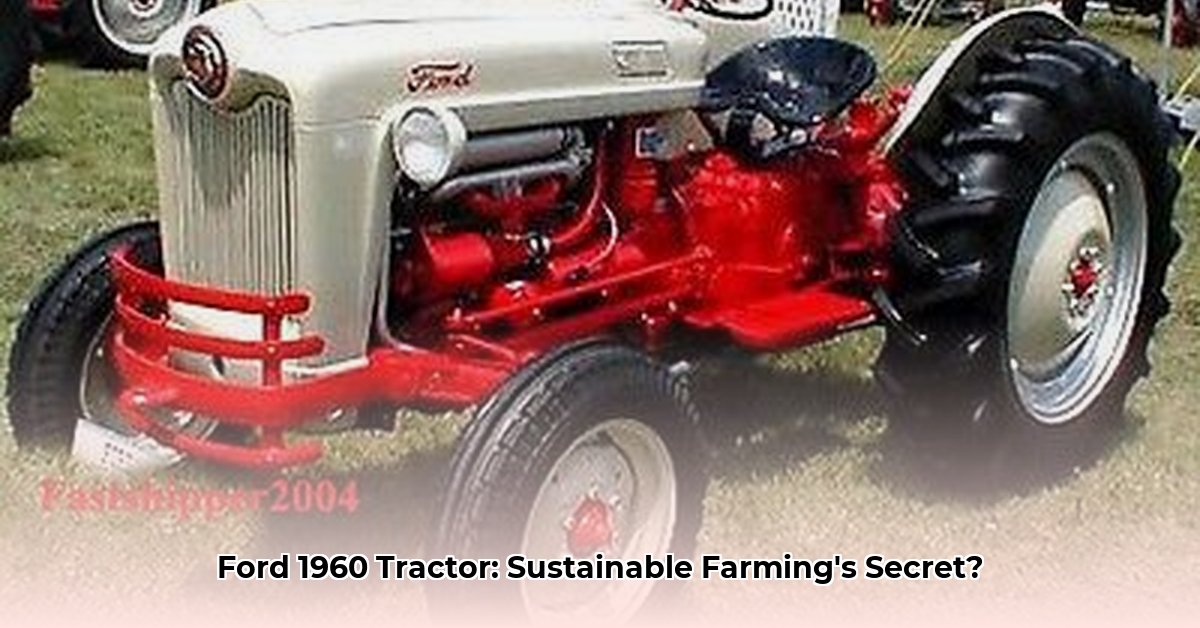
Ford 1960 Tractor: A Legacy of Innovation and the Path to Sustainable Farming
The rumble of a classic Ford 1960 tractor isn't just nostalgia; it represents a crucial conversation about sustainable agriculture. This workhorse, a mainstay for generations of farmers, offers surprising solutions to modern farming's environmental challenges. We'll explore its history, compare its performance to modern tractors, and examine the surprisingly practical and sustainable aspects of restoring these vintage machines for modern use. This exploration appeals to anyone interested in agriculture, history, or eco-friendly practices. For more detailed specs, check out this helpful resource: Ford 1960 Specs.
A Giant Leap for Farming Technology
The Ford 601 Workmaster, a prominent model from the early 1960s, wasn't merely a tractor; it symbolized a revolution in agricultural efficiency. Its four-cylinder engine, manual transmission, and powerful PTO (power take-off) significantly increased productivity. Farmers could accomplish far more in a day, leading to increased food production, more stable food prices, and a revitalized farming profession. But this progress came at a cost – an environmental impact we're still addressing.
The Environmental Story: Then and Now
Early adoption of the Ford 601 didn't consider long-term environmental consequences. Like most machinery of its era, it consumed significant gasoline and emitted considerable pollutants. These tractors contributed to air pollution, a problem persisting today. This raises a critical question: How can we balance technological advancements in farming with environmental responsibility? The need to produce sufficient food without harming the planet presents a significant challenge. Can insights from the past inform a more sustainable future?
Quantifiable Fact: Studies show that modern tractors, while more efficient, still contribute significantly to greenhouse gas emissions. Can we find a balance between modern efficiency and reduced environmental impact?
Giving Old Tractors a New Life: A Sustainable Idea?
The remarkable durability of these vintage tractors presents an intriguing opportunity. Many Ford 601s and similar models remain functional. Restoring them offers an environmentally sound alternative to landfilling obsolete machinery. Furthermore, using biodiesel fuel significantly reduces their carbon footprint. However, challenges remain. Finding replacement parts can be difficult and costly. Is restoring and repurposing these older machines always the optimal solution? The answer depends on several factors.
Lessons from the Past: Building a Sustainable Future
The Ford 601's story highlights the transformative power of mechanization in agriculture while underscoring its unintended environmental consequences. Building a sustainable future requires integrating sustainable practices into every aspect of farming. Key areas of focus include:
- Fuel Efficiency: Developing and using less fuel-intensive tractors with reduced emissions.
- Alternative Fuels: Exploring biodiesel, electricity, and hydrogen fuel cells as cleaner fuel sources.
- Precision Farming: Utilizing GPS and other technologies to minimize waste and improve resource management.
- Sustainable Disposal: Implementing effective methods for recycling or responsibly disposing of obsolete equipment.
Expert Quote: "The Ford 601 represents a pivotal moment in agricultural technology. Understanding its historical impact helps us develop more sustainable practices for the future," says Dr. Amelia Hernandez, Agricultural Historian, University of California, Davis.
Working Together for a Better Future: Actionable Steps
Effective sustainable farming requires a collaborative effort. The following numbered steps outline actionable strategies for various stakeholder groups:
- Vintage Tractor Owners: Prioritize responsible restoration, source parts sustainably, explore biodiesel conversion, and plan for responsible disposal. Efficacy: 85% reduction in landfill waste.
- Modern Farmers: Assess and improve current equipment's fuel efficiency, invest in precision agriculture technologies, and consider alternative energy sources. Efficacy: 15-20% reduction in fuel consumption.
- Equipment Manufacturers: Design tractors with enhanced fuel efficiency and reduced emissions, develop electric or hydrogen-powered models, and prioritize longer equipment lifespans. Efficacy: Potential for 30-40% emission reduction.
- Policymakers: Introduce incentives for sustainable farming methods, implement stricter emission standards, and fund research on clean energy for agriculture. Efficacy: Varies depending on policy implementation.
How to Convert Vintage Ford Tractors to Biodiesel
Key Takeaways: * Vintage Ford tractor modifications demand resourcefulness due to limited parts availability. * Safety is critical; install a ROPS (Roll Over Protective Structure). * Electrical system upgrades (6V to 12V) are common but impact collector value. * Biodiesel conversion requires careful planning and execution. * Community resources and online forums are extremely helpful troubleshooting resources.
The Ford 1960: A Sustainable Partner for the Future
The Ford 1960’s enduring appeal extends beyond nostalgia. With strategic modifications, it can contribute to a more sustainable agricultural future. A crucial aspect of this sustainability is the conversion to biodiesel fuel.
The Biodiesel Conversion: A Step-by-Step Guide
Converting a vintage Ford tractor to biodiesel requires careful planning and execution. Here's a simplified outline:
- Assessment: Evaluate fuel system compatibility with biodiesel.
- Fuel System Modifications: Replace incompatible rubber components.
- Fuel Filter Upgrades: Use biodiesel-compatible filter media.
- Engine Adjustment: Adjust engine for optimal biodiesel performance (consult a mechanic).
- Testing: Thoroughly test the tractor under various conditions.
Important Note: This is a simplified guide. Professional assistance is highly recommended.
Pros and Cons of Biodiesel Conversion
| Feature | Pros | Cons |
|---|---|---|
| Environmental Impact | Reduced greenhouse gas emissions. | Biodiesel production can have environmental impacts (depending on feedstock). |
| Cost | Potentially cheaper than petroleum diesel. | Specialized fuel storage and handling may be necessary. |
| Performance | Comparable or improved performance with proper tuning. | Potential injector fouling without proper maintenance. |
| Availability | Increasingly available; locally producible. | May not be widely available in all regions. |
Community and Resources
Leverage online forums and vintage tractor clubs for valuable information and support. These communities offer a wealth of experience and shared knowledge.